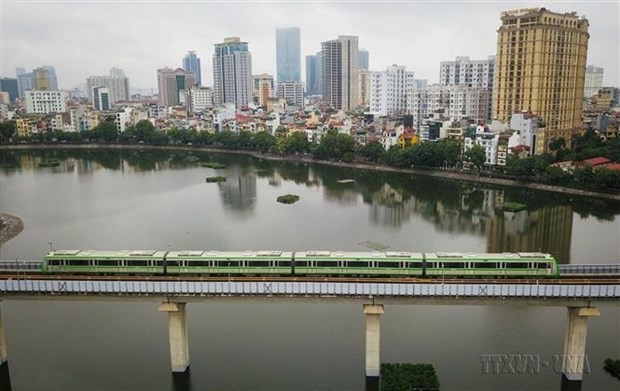
Hanoi records changes after administrative boundary adjustment
Latest
The decision was hailed as of historical significance, reflecting a strategic vision and opening a new period for the city's development.
 |
| Cat Linh - Ha Dong urban elevated railway, which stretches over 13km, was put into operation on November 6, 2021. (Photo: VNA) |
The city’s Gross Regional Domestic Product (GRDP) in the 2011-2022 period increased by an average of 6.67 per cent per year, including services (6.77 per cent), industry-construction (8.19 per cent), and agriculture (2.87 per cent).
The city’s economy has revived rapidly after the COVID-19 pandemic. It recorded year-on-year growth of 8.89 per cent in the gross regional domestic product in 2022, higher than the target of 7- 7.5 per cent, according to the Municipal Statistics Office.
This is a high rate compared to those in many recent years, showing local authorities' determination and businesses' efforts, it said.
State budget collection in the city reached 333 trillion VND last year, equal to 106.8 per cent of the estimate. Of which, domestic revenue totaled 303 trillion VND, the highest in the country.
Hanoi’s GRDP grew by 5.97 per cent in the first half of 2023, 1.6 times higher than the national average. The city’s budget revenue rose by 22.9 per cent over the same period last year.
The city has carried out plans on improving the investment and business environment, thus raising the confidence of domestic and foreign investors.
Compared with the northern key economic zone and the whole country, although Hanoi accounts for only 21.2 per cent and 1 per cent, respectively in area, 41.7 per cent and 8.1 per cent in terms of population, the capital city contributes 47.46 per cent and 12.59 per cent in terms of GRDP.
It also contributes 52.48 per cent and 17.07 per cent in terms of state budget revenue and 14.19 per cent and 4.61 per cent of export turnover.
The capital city attracted 1.69 billion USD in foreign direct investment (FDI) last year, among the country's top localities in this field. The figure represents a year-on-year rise of 10.3 per cent. It lured 2.26 billion USD of FDI capital in the first six months of this year.
Despite challenging economic conditions such as low demand for goods and reduced purchasing power, Hanoi's commercial activities are still thriving.
The average total retail sales of goods and social consumption services increased by 12.84 per cent in 2011-2015, 9.14 per cent in 2016-2020, and 9.3 per cent in 2021-2022.
The scale of total retail sales of goods and services for social consumption in 2022 hit about 698 trillion VND, nearly 3.4 times higher than in 2010.
Payment methods based on modern technology and e-commerce account for about 7 per cent of total retail sales of goods and services.
Despite the COVID-19 pandemic, Hanoi's export turnover increased by an average of 7.67 per cent from 2016-2020. In 2021-2022, export turnover expanded at an average rate of 6.16 per cent per year.
Agricultural and rural development is always a focus of Hanoi authorities. So far, 15 out of 18 districts have met the new-style rural standards. Per capita income in rural areas reached 56.3 million VND in 2022.
The rural facelift has changed positively to become more civilized and modern, while the values of traditional cultural identity are preserved and promoted.
The city is striving to complete the task of the new-style rural building by 2025, effectively manage and use land and water resources, protect the environment, conserve biodiversity, sustainably develop ecosystems, proactively respond to natural disasters, adapt to climate change, and ensure agricultural production and people's safety.
In the 2023-2025 period, Hanoi will focus on accelerating the restructuring progress of the agricultural sector, renewing its growth model following the promotion of clean, organic, and ecological farming.
It will also prioritize creating favorable conditions for businesses to invest in agriculture and rural areas to create more jobs and improve people's incomes.

















